When Father Joseph Friend got a phone call from his bishop early one morning and heard he was going to a global gathering of priests at the Vatican, he thought it was a joke. Only five pastors from the United States were selected to attend the meeting of 200 priests.
Bishop Anthony Taylor of the Diocese of Little Rock—which encompasses the entire state of Arkansas—assured him he was serious.
Ordained in 2020, Father Friend serves as pastoral administrator of three rural churches in southeast Arkansas. He was tasked with bringing his perspective as a pastor on the margins to the international gathering. The Vatican had asked American bishops to give preference to parish priests with “significant experience in the perspective of a synodal Church,” meaning a Church that walks closely with its people. Father Friend fit the bill.
The event, called “Parish Priests for the Synod: An International Meeting,” was held from April 28 to May 2. At the gathering, the young priest talked about his experience as a shepherd of diverse churches that cover great distances and socioeconomic realities.
One such church is Holy Spirit in Hamburg, below, which used its limited resources to convert an old tire shop into a new church with help from Catholic Extension Society.
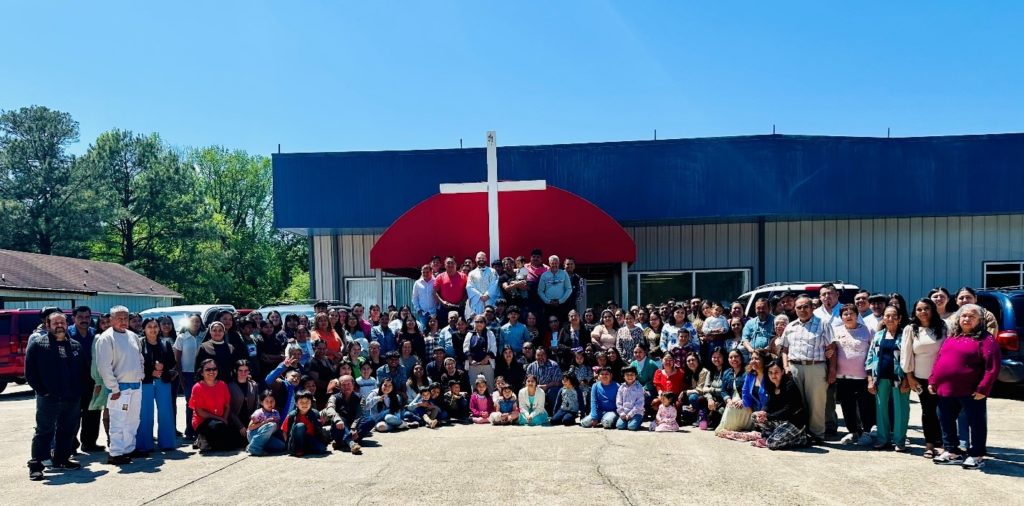
There had previously been no Catholic presence in the area.
The Catholic population in Arkansas has grown dramatically in recent years, especially in areas where there are many families with few financial means. Six new churches have been established in the past 15 years.
“Catholic Extension support was crucial for these projects,” Bishop Taylor said.
Catholic Extension Society has also supported the work of religious sisters from Latin American countries who minister and reach out to this growing population, including the Missionary Carmelites of St. Teresa, pictured below with Father Friend.
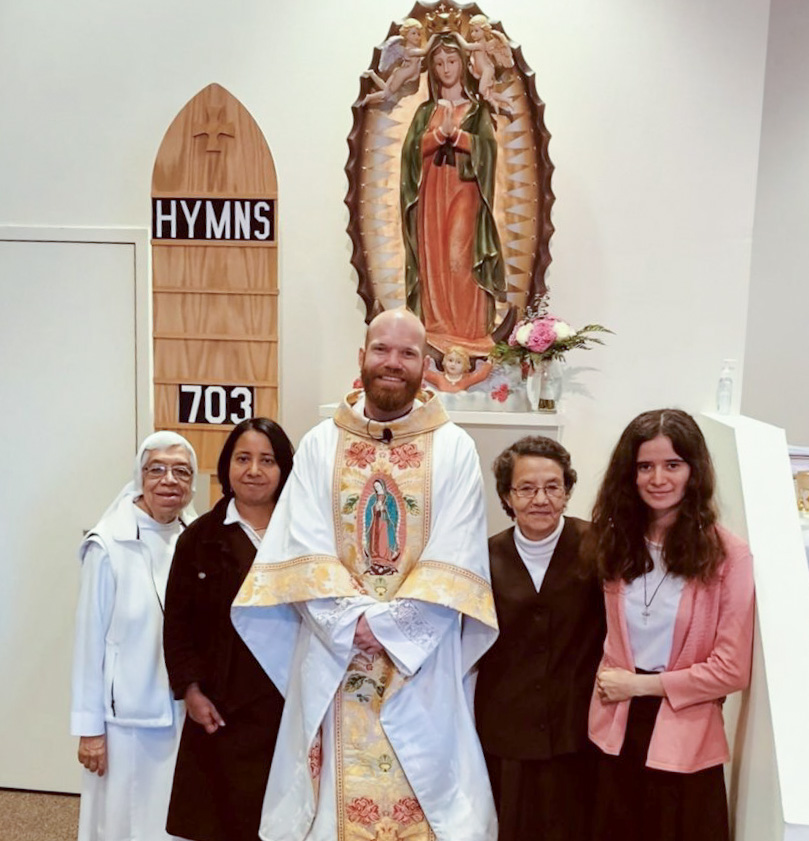
The discussions and feedback that arose from the meeting that Father Friend attended are part of the Synod on Synodality. This is a three-year process, which began in 2021, of listening and dialoguing within the global Church. Church leaders are using parish priests’ feedback to inform final discussions and documents as the synod is scheduled to conclude later this year.
Father Friend’s parishioners were thrilled to have their pastor represent them and their experiences as Catholics.
“I think just for them to be seen and known by the universal Church, it just gave them a sense of healthy pride, healthy ownership in their ministry that we’re going to be seen by the pope,” he said.
Revealing American realities
Father Friend brought the spirit of the people of Arkansas with him to Rome. He wanted to make sure their voices were heard.
“I didn’t have an agenda or one thing I wanted to prove,” he said. “I just said, ‘I’ve gotten to know my people, and I just want to be faithful to them.'”
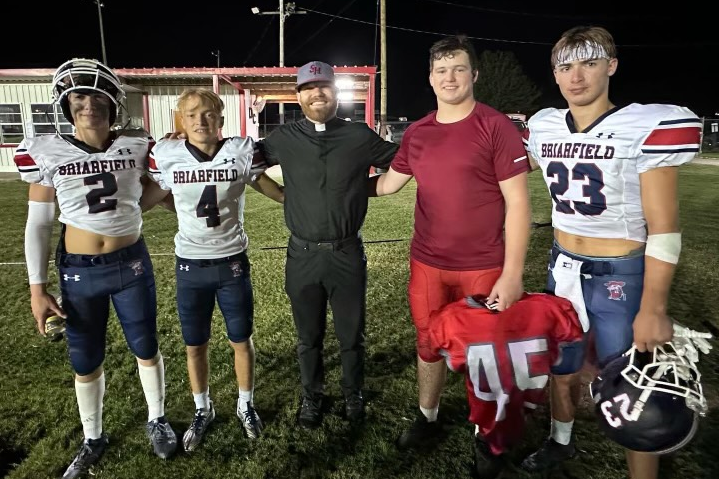
He believes that Catholics in Arkansas live out Pope Francis’ vision of a mission-driven Church.
“One of the pope’s messages is that we get too caught up in the words of the Church. But we’ve got to live it. And where does it live but in the grassroots areas where it may be there’s not a ton of money … but simply living the faith well. I think that’s one of the beauties of the Diocese of Little Rock,” he said.
Father Friend encountered priests from all over the world.
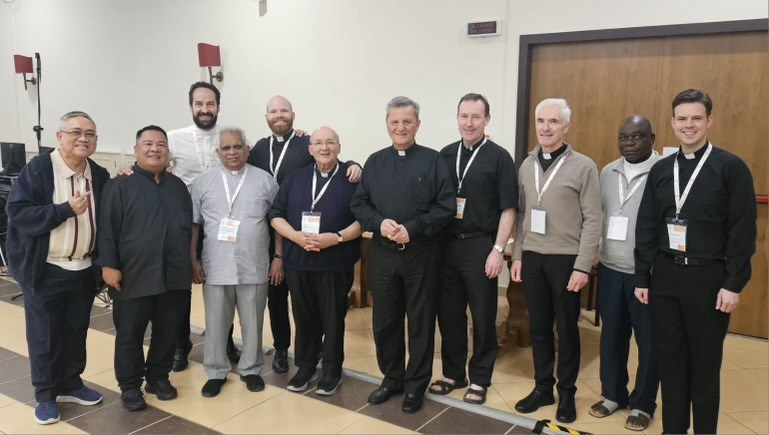
He discovered how truly important it was to speak on the realities of his corner of the country.
“No one in the world knows where Arkansas is,” he said.
Most of the people he met were shocked to learn about the vulnerability of the people he serves. They did not realize there are poor people in America.
“I’m in the Delta in Arkansas, and there’s a lot of poverty and a lot of people who struggle,” Father Friend said. “But there’s a lot of faith here, there’s a lot of really good people, and we don’t have a lot of paid staff. So there’s a lot of people sacrificing their time and living their faith and doing it well in an area where there’s not many Catholics.”
This is no more evident in the conditions of Holy Spirit’s previous church. The used to hold religious education classes in a building that was no more than a shack.
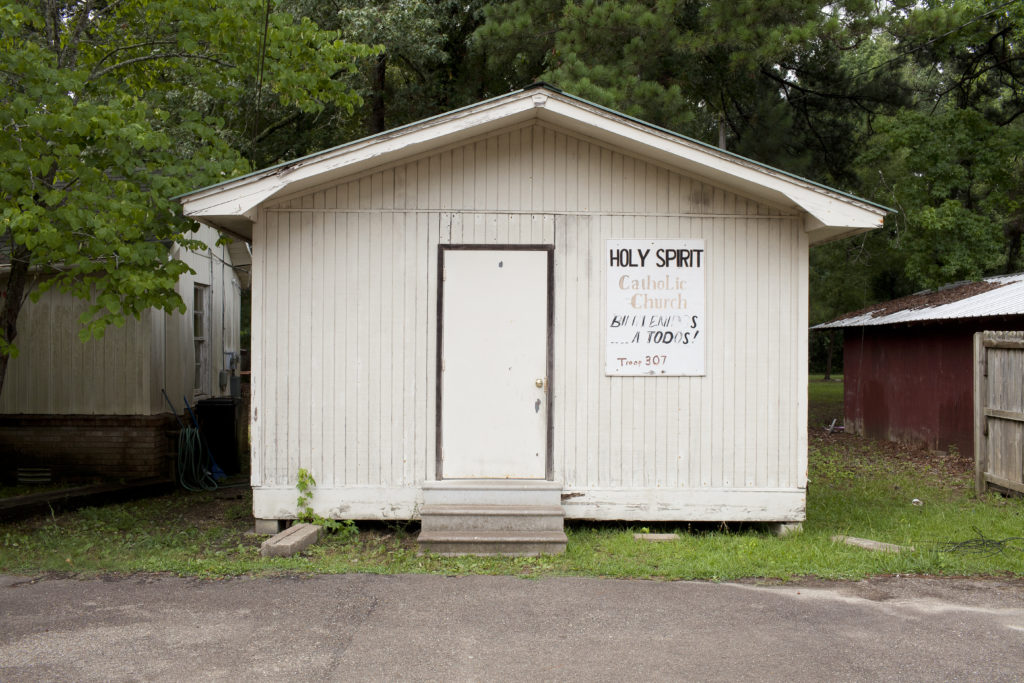
If the international priests that Father Friend met weren’t surprised by the reality of poverty in America, they certainly were by his Spanish-speaking skills.
He became friends with a priest from Mexico whose “mind was blown” when he learned that not only were there Hispanics in Arkansas, but they make up the majority of Catholics in the state. Furthermore, Bishop Taylor has made it a rule for all seminarians to learn Spanish.
The Mexican priest said he wanted to thank the bishop and the priests of Arkansas “for taking care of our people.”
A message from the pope
Father Friend’s fellow priests weren’t the only people surprised by his bilingualism.
“I saw the shock on Pope Francis’ face when I started speaking to him in Spanish,” Father Friend said.
“He sees the name tag is United States, and walking up is some white dude. Then I start speaking with a Mexican accent, and he’s like, ‘What’s this?’”
Father Friend took the brief moment he had with the Holy Father to share the special story of the people he serves.
“I told him, it’s through the story of the immigrant, and the story of my people, that’s why I’m able to speak to you in your native tongue.”
He continued, “I showed him a picture of Hamburg. Because the story of the converted tire shop to a church—that’s the faith, that’s where the faith is taking root. It’s the missionary aspect of getting to the core of our beliefs here. And so I wanted to tell them that story. So I showed him and he blessed the people and he looked back up.”
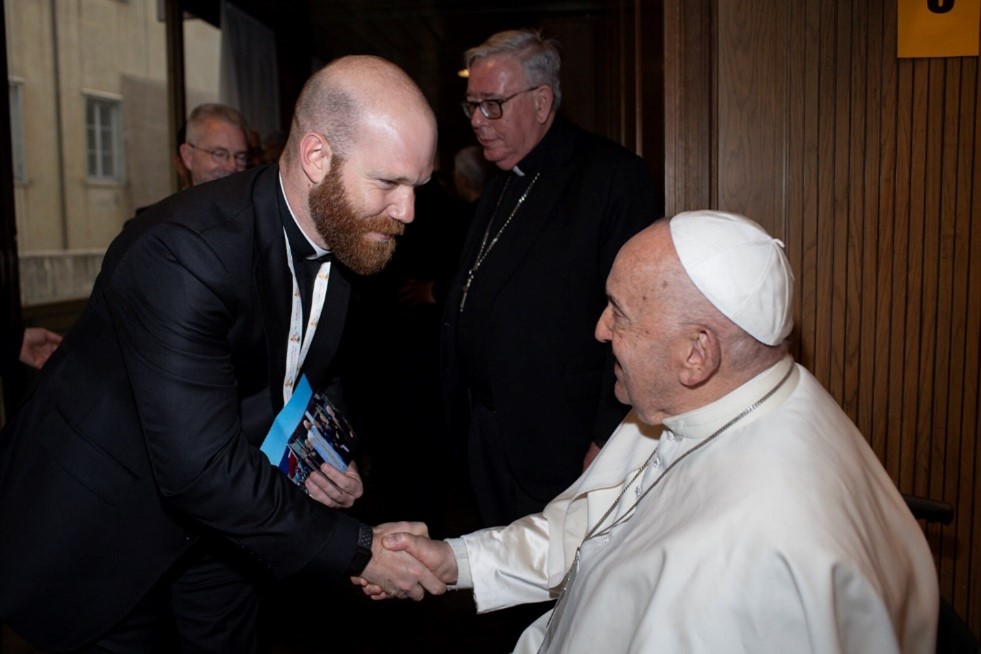
“And he tapped the picture very lovingly and he looked up at me and he said, ‘Continua a trabajar con los imigrantes.’ Continue to work with the immigrants. Time stood still when he responded to me. It was a cool message for our diocese.”
When Father Friend returned to his communities, he thanked his Spanish-speaking parishioners for helping him improve in the language and giving him the confidence to speak to the Argentinian-born pope in his native tongue.
Where does the Church go from here?
Father Friend felt a “flame” during his time in Rome—a spirit of joy that he brought back with him to Arkansas. He is continuing the ongoing process of listening. He says his job is far from over.
“There’s a hunger for learning the faith right now and that’s good. But I also think we can get into analysis paralysis. I think the most helpful thing people can do is they can read this from Catholic Extension and put it down and say, ‘I need to go do something for my faith.’
“This is the beginning of, hopefully, a vision of Church that we haven’t implemented yet that Vatican II called us to do. Now it’s time to take those beautiful documents and put them into action.”
Father Friend continued,
I think our culture is feeling that urgency, of needing to live the faith now in a very real way.”
“Like to say, I don’t have to agree with you,” Father Friend said, “but I’m going to talk to you because you’re my brother. You’re not a set of agendas. You’re not a set of sound bites from CNN or Fox News. That’s not who you are.”
“We are baptized members in the faith, and we have to recognize that core in us that we have to love one another and have tough conversations and know that we can handle tough conversations. Good siblings fight because they know they’re going to be there tomorrow. And I think the pope is really pushing us to have good conversations like that.”
One of the biggest takeaways from the synodal process so far, Father Friend said, is a desire for connectedness. “Everyone was desiring belonging. And synodality is the concrete push from the pope to live in community.”
Catholic Extension Society works in solidarity with people to build up vibrant and transformative Catholic faith communities among the poor in the poorest regions of America. Please donate today to support pastors like Father Joseph Friend!


